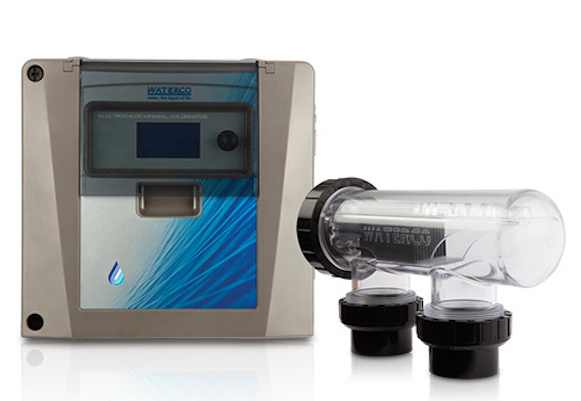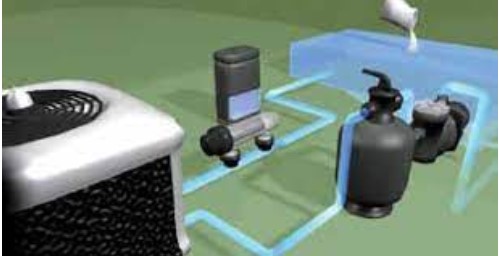
A pool salt chlorinator is a device used in swimming pools to maintain proper levels of chlorine for water sanitation. It provides an automated, convenient way to generate chlorine by utilizing salt and eliminating the need for manual chlorine addition.

How does a salt chlorinator work?
The saltwater chlorinator works on the principle of electrolysis, where the dissolved salt (sodium chloride) in the pool water is converted into chlorine gas, which then dissolves, forming hypochlorous acid and other chlorine compounds that sanitize the pool by eliminating bacteria, algae, and other contaminants.
What is the difference between Salt Chlorinator Chlorine and 'Normal' Chlorine?
A 'salt chlorinator' generates chlorine just like a chlorine factory, but it’s produced on site within the pool. The liquid chlorine is around 12.5% pure, whereas pool salt chlorinator chlorine boasts 100% purity.
What are the benefits of pool salt chlorinators?
Chemical Reduction
With the consistent presence of chlorine, the demand for additional sanitizing chemicals decreases, resulting in cost and time savings while contributing to an environmentally friendly approach.
Effortless Upkeep
Experience hassle-free maintenance as the pool chlorinator effortlessly introduces chlorine into the water. Synchronize it with the filtration system for automated operation even when one is away. Regular pool water testing remains essential for maintaining the pool's equilibrium.
Economical Solution
Although salt chlorinators may entail a slightly higher initial investment, they prove economical over time. By minimizing chemical usage and maintenance requirements, they ultimately reduce expenses.
Intelligent Innovation
Stay ahead with modern chlorinators with smart features like remote control through Bluetooth or Wi-Fi that simplifies management and intelligent sensors that adjust chlorine levels in cold water, extending the salt cell's longevity.
Components of pool salt chlorinators
Power Supply/Control Panel
Regulates output power to the salt cell, offering data on salinity and temperature.
Conversion Cll
The core component that transforms dissolved salt into chlorine gas is important for sanitation.
Water Flow Sensor/Switch: Detects proper water flow through the cell, safeguarding the generator's function.
Salt
High purity salt is added based on pool volume; it dissolves to generate chlorine through electrolysis. Replenishment is only needed during pool drainage or maintenance.
Lifespan of Salt Chlorinators
Salt chlorinators, much like electronic devices, have a limited lifespan. Regular maintenance is essential. Generally, they have a lifespan of 3-7 years, with higher-priced units featuring more advanced capabilities tending to last longer.
Employing suitable salt and proper maintenance contributes to longevity. A malfunctioning salt chlorine generator can turn into a homeowner's nightmare.
Regular checks that must be performed on salt chlorinators
Regular maintenance is key to ensuring your salt chlorinator's optimal performance. Here's what you need to check regularly:
Power and Wiring
Verify that your unit is properly connected and that the circuit breaker or GFI outlet hasn't tripped.
Salt Levels
Accurately measure salt levels using testing strips or meters, as displayed readings might be inaccurate.
Water Flow
Ensure unobstructed water flow by cleaning pump and skimmer baskets, impellers, filters, and inline strainers.
Water Balance
Monitor pH and Cyanuric Acid (CYA) levels to ensure effective chlorine action. Maintain pH at 7.2-7.6 and CYA at 40-60 ppm.
Pump Running Time
Adjust your salt system's capacity according to pool pump runtime, especially in hot weather.
Programming and Size
Ensure the correct programming for pool size and salt cell type. Professional assistance may be best for accurate setup.
Salt Cell Inspection
Regularly inspect and clean the salt cell to prevent scaling buildup and enhance chlorine output and longevity.
Occasional Need for Standard Pool Chlorine
Periodically, adding standard pool chlorine might be necessary. Instances like heavy rainfall or the need for a chlorine level shock can prompt its use. Despite the benefits of a salt chlorinator, occasional supplementation with traditional chlorine may still be required.
In Summary
A pool salt chlorinator offers a revolutionary approach to pool maintenance by generating pure chlorine on-site through electrolysis.
This innovation not only offers a cost-effective and environmentally friendly solution by decreasing the reliance on other chemicals and swimming pool equipment but also provides convenience through automated operation and smart features.
Regular maintenance is crucial to ensuring peak performance and prolonging the device's lifespan. While the advantages are substantial, occasional supplementation with traditional chlorine remains a wise practice to guarantee consistently clear pool water.